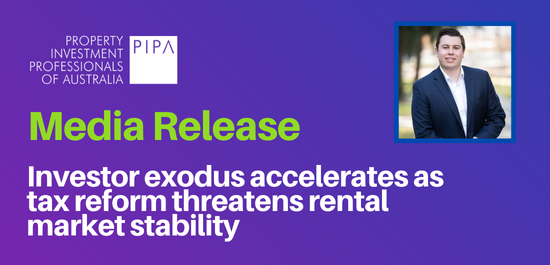Two thirds of investors report negative cash flow – PIPA investor survey
Apr 2025Karen Millers
Categories
Location ReportsMedia releasesNational market updatesPersonal advisersPIPA AdviserPIPA Annual Investor Sentiment SurveysPIPA Member ProfilesPIPA video updatesPIPA webinarsPodcastsProperty advisersProperty newsUncategorisedLatest Articles
The 10 “hottest” property markets around the nation revealed
TEA TREE GULLY : North Eastern Suburbs of Adelaide
Safeguarding Property Businesses Against Cyber Threats
Young purchasers sidelined as key buyer group returns to market
With the Federal Election now called, politicians are reminded that two-thirds of property investors are in negative cash flow with additional financial input required to top up mortgage repayments and property expenses – a sharp increase on the year before, according to PIPA research.
The 2024 PIPA Annual Investor Sentiment Survey found that nearly 65 per cent of respondents indicated that the rental income from their residential investment property or portfolio of residential properties was negative cash flow.
The 2023 PIPA Annual Investor Sentiment Survey found that 57 per cent of investors had negative cash flow.
PIPA Chair Nicola McDougall said the results reinforced the serious drag on investor finances during a time of high interest rates.
“There has been much conjecture and commentary about investors somehow cashing in from higher rents over the past few years, but this data shows that most investors need to tip in additional funds to keep their properties financially above water,” Ms McDougall said.
“Interest rates remain significantly higher than they were a few years ago and while rents have risen, they are a drop in the ocean compared to higher lending costs.
“Let’s not forget that the survey also found that 57 per cent of investors who were thinking about selling in the near future would do so because of higher holding costs – the number one reason.”
Further analysis of the survey data found that negative cash flow was reported by:
- 67 per cent of investors who own one property
- 72 per cent of investors who own two properties
- 66 per cent of investors who own three properties
According to the Australian Tax Office, 71 per cent of investors own just one dwelling, 18 per cent own two, with five per cent owning three – a percentage that has been statistic for many years.
Drilling down into the data further, the average property investor who owns one dwelling is not betting on their cash flow situation changing anytime soon, Ms McDougall said.
“About 60 per cent of respondents who owned one investment property indicated they were expecting to be negative cash flow for at least five years, including 13 per cent who believe it will take at least 10 to 20 years or more,” Ms McDougall said.
“For those investors with two dwellings, 54 per cent expect to be negative cash flow for more than five years, including 14 per cent who say it will be at least 10 to 20 years.”
About 47 per cent of investors who own three dwellings indicated their portfolio will be negative cash flow for five years, with 11 per cent saying it will be that way for 10 to 20 years, according to the survey.
Ms McDougall said negative cash flow was not a property investment strategy for educated investors given it requires additional financial input from their employment income or savings.
“Just consider that 42 per cent of survey respondents also indicated that their cash flows were tight with a further 11 per cent indicating that their working income was not covering the shortfall currently, so they were drawing on savings,” she said.
“It’s clear that investors and tenants are both struggling in the high property cost environment at present, however, investors are often doing without to ensure they can cover the shortfall between the rent they receive and the high costs associated with owning one or two investment properties.”
ENDS
For more information, or to organise an interview, please contact:
Bricks & Mortar Media | media@bricksandmortarmedia.com.au
About PIPA
Property Investment Professionals of Australia (PIPA) is a not-for-profit association established by industry practitioners with the objective of representing and raising the professional standards of all operators involved within property investment.




